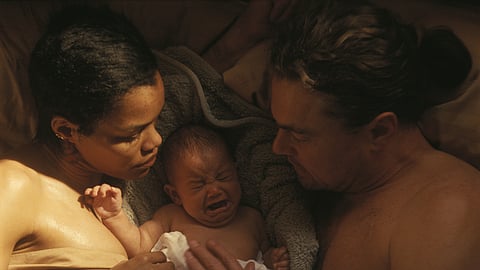

Spoiler Alert: The following feature discusses the plot points of director Paul Thomas Anderson's latest film in detail.
For a film that explores the cyclical nature of violence in America and the country's complex immigration laws, Paul Thomas Anderson's One Battle After Another has a father-daughter angle that forms the emotional core of the film. Anderson's first film in four years stars Leonardo DiCaprio as Bob Ferguson, a former revolutionary who lost his belief in the radical, violent ways in which his wife fights against the immigration policies and oppression in the US. After their separation, law enforcement catches Bob Ferguson's wife Perfidia (Teyana Taylor) for an act of crime, forcing her to rat out her fellow revolutionaries and go under witness protection to escape jail time. Bob Ferguson is aware of the folly of his wife's ways, but he only tells his daughter Willa (Chase Infiniti) that her mother died a war hero. This reveals two truths: one, Ferguson harbours a profound sense of love for his daughter and desire to keep her away from her mother's revolutionary path; and second, his enduring affection for his wife despite their political chasm.
While Ferguson can ensure his daughter never owns a cell phone, he must certainly have played a role in cultivating her mother's revolutionary spirit. He has ensured that she learns karate from Sensei Sergio St Carlos (Benicio del Toro), one of the leaders in the undocumented immigrant community in Baktan Cross. With this in the back of mind, Ferguson must have always known that it would be an uphill task to keep Willa away from the movement. The mere fact that Willa knows karate speaks volumes about the level of care and concern Ferguson has for her. At the same time, towards the end of the film, Perfidia writes a letter to her daughter Willa, where she acknowledges her past mistakes, asks for her forgiveness and even demands that she kiss her father on the forehead. It is an important detail that shows you the affection and care she has for Bob Ferguson, despite her own deviance from the norms he adheres to. This is a moment of grace, perhaps, which ties the broken family back together through their daughter.
When an unarmed Willa walks off to join other revolutionaries at the end, the film suggests that the revolution must continue, yet in an evolved manner—one that discards the extreme, violent tactics of their predecessors. Meanwhile, Ferguson's acceptance of his daughter's involvement in the movement hints at his realisation that he cannot fight her destiny. Having fought his own battles, he must now accept the passing of the baton from one generation to the next.
The reciprocation of love and peace in a film that talks about violence and revolution is the factor that makes it the most resonant among all Anderson films. It is there throughout the film, including even in the portions featuring Sean Penn’s Colonel Steven J Lockjaw. When Lockjaw shows Willa that he is her biological father, she does not care and insists that Ferguson is still her real dad. It is an emotionally powerful scene in a film full of such moments.
Another beautiful moment comes when Ferguson, pursuing an enemy, finally finds Willa, who has already killed that enemy and is standing with the gun, unaware the person following the foe is her own father. Despite identifying him, Willa demands a revolutionary code from Ferguson at the end, while he insists that he is her father instead of giving the code. Willa finally puts the gun away and gives in to her father’s unrelenting love. It illustrates that their familial bond ultimately transcends the old, rigid rules of political ideology.